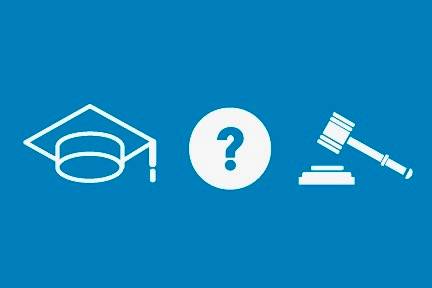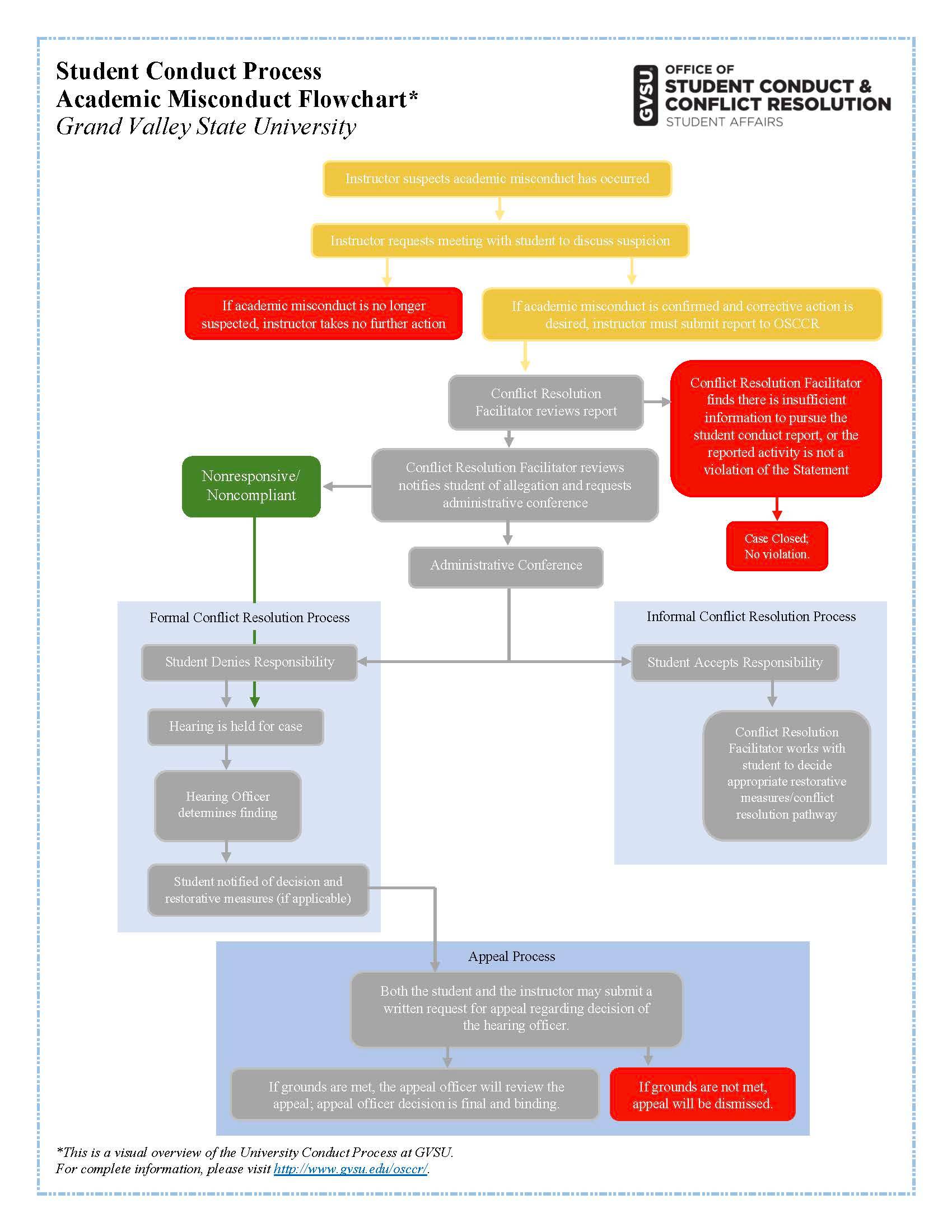What to Expect When You are Accused of Academic Misconduct
Suspected Academic Misconduct
If you are accused of committing academic misconduct, you should read this page, as well as the academic misconduct policies in section 5.0 of the Student Code: The Anchor of Student Rights and Responsibilities carefully.
For an overview of how the student conduct process works in relation to academic misconduct, you can review the information on this PDF document or the Academic Misconduct Procedures section below. You can also reach out to the Office of Student Conduct and Conflict Resolution (OSCCR) via email at [email protected] with any questions or concerns.

Academic Misconduct Policies
5.1 Academic Misconduct
Academic Misconduct is defined as any action or behavior that misrepresents one’s contributions to or the results of any scholarly product submitted for credit, evaluation, or dissemination. The following behaviors contradict the values of the University community and are subject to action under the Statement. This includes but is not limited to:
5.1.1 Cheating
Attempting to use materials, information, or aids that have not been authorized by the instructor for academic work.
5.1.2 Collusion
Unauthorized collaboration with another person in preparing academic assignments offered for credit, and collaboration with another person to commit a violation of any section of the rules on academic misconduct.
5.1.3 Dual Submission
Submitting work that has been previously graded, or is being submitted concurrently to more than one course, without authorization from the instructor(s) of the class(es) to which the student wishes to submit.
5.1.4 Falsification and Fabrication
Falsification: Manipulating research materials, equipment, or processes, or changing or omitting data or results such that the research is not accurately represented in the research record.
Fabrication: Making up data or results and recording or reporting them.
5.1.5 Plagiarism
Appropriation of, buying, receiving as a gift, or obtaining by any means material that is attributable in whole or in part to another source without any indication or citation of the original source, including words, sentences, ideas, illustrations, structure, computer code, and other expression or media, and presenting that material as one’s own academic work being offered for credit or in conjunction with a program, course, or degree requirements.
Academic Misconduct Procedures
The image to the right describes the student conduct process for academic misconduct, but below you will find a description of each step of the process:
Initial Outreach and Administrative Conference
1. If an instructor suspects academic misconduct has occurred they must meet with the student in person, over Zoom, or converse via email about the suspected academic misconduct;
2. After meeting with the student, the instructor may choose to either A) take no further action if they no longer believe academic misconduct has occurred, or B) report the alleged academic misconduct to OSCCR. When reporting a situation of alleged academic misconduct to OSCCR, the instructor will give their recommendation for the academic penalty they feel is most appropriate for the situation. The instructor may not issue an academic penalty to the student on their own, as academic penalties for academic misconduct may only be issued to a student when the student conduct process has concluded if responsibility has been determined for the case;
3. When OSCCR received the report, they will review the report and either A) close the case if there is not sufficient evidence to substantiate the alleged academic misconduct, or B) schedule a meeting with the student;
4. If the OSCCR staff member assigned to the case (the Conflict Resolution Facilitator, aka CRF) meets with the student, they will discuss the alleged violation(s) of academic misconduct, go over the student's options moving forward, and walk the student through restorative justice and the process for repairing harm. The student will then have three business days from the day of the meeting to send their CRF their Accept/Deny form. The student can either A) accept responsibility for the alleged violation(s) of academic misconduct, or B) deny responsibility for the alleged violation(s) of academic misconduct. If the student does not attend the administrative conference meeting with their CRF, a hearing will be scheduled for the case;
5. If the student accepts responsibility for the alleged violation(s), they will then be issued a letter through the internal Advocate system informing them of the academic penalty they will be receiving as recommended by their course instructor, as well as the restorative measures discussed during the meeting that will be addressing the harm done in the situation. If the student denies responsibility, a hearing will be scheduled for the case.
Hearings
6. When a student denies responsibility for an alleged violation(s) and requests to have a hearing for their case, they will indicate on their accept/deny form that they want a hearing officer from the faculty members in the University Conduct Pool) to oversee their case.
7. The complainant will be invited to attend the hearing where, if present, they will make the case against the student for why they believe the student has violated an academic misconduct policy(s); the complainant will also be permitted to submit additional evidence and/or a witnesses(s) at least one (1) full business day in advance to be included in the hearing packet for the hearing. The student will also be invited to attend the hearing to make their case for why they believe they did not violate the academic misconduct policy(s); the student will also be permitted to submit additional evidence, bring a witnesses(s), and/or bring a support person to the hearing, all of which must be submitted at least one (1) full business day in advance.
During the hearing, the hearing script (located in the hearing packet) will be followed that greets all attendees, explains the purpose of the hearing, and allows time for the complainant and the responding student to present all relevant information related to the allegation, as well as ask and answer questions.
Once the hearing has concluded the hearing officer has three (3) business days to make their decision of responsibility or not; they will then notify the CRF, who from that point also has three (3) business days to notify the responding student and the complainant of of the hearing body's decision, rationale, and any restorative measures, if applicable.
Appeals
8. If you disagree with the decision made by the hearing officer, you may submit a request for an appeal within three (3) business days of being notified of the hearing officer's decision. You will file your request for appeal through the individualized URL link which can be found in your 'Appeal Decision' letter through the Advocate system. The appeal grounds are as follows:
- Procedural error large enough to alter the decision of the hearing officer
- Conflict of Interest that would alter the decision of the hearing officer
- New information/evidence not available at the time of the hearing that would alter the decision of the hearing officer
If your appeal request is substantiated, an appeal officer will be assigned to your appeal. The appeal officer will convene shortly after your appeal request has been reviewed, and they have three (3) business days from the date of their appeal meeting to make their decision to either A) dismiss the appeal and uphold the original decision, B) grant the appeal and remand the case back to the original Hearing Officer for reconsideration citing the findings of the Appeal Appeal Officer, C) grant the appeal and require a new hearing with a different Hearing Officer, or D) grant the appeal and modify the restorative measures required.
The decision of the appeal officer is final.

